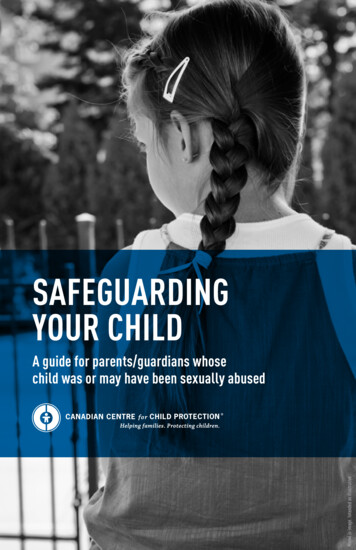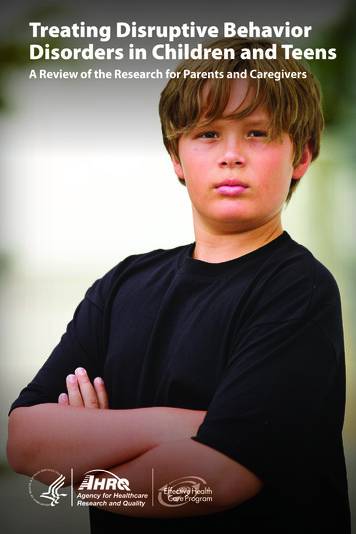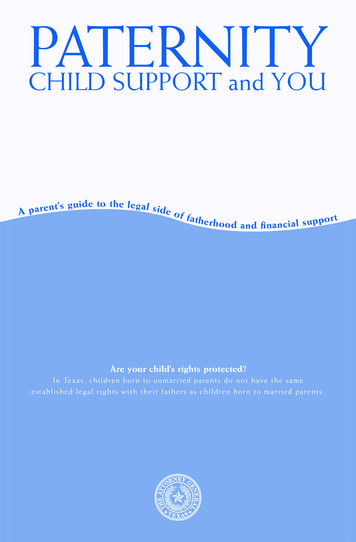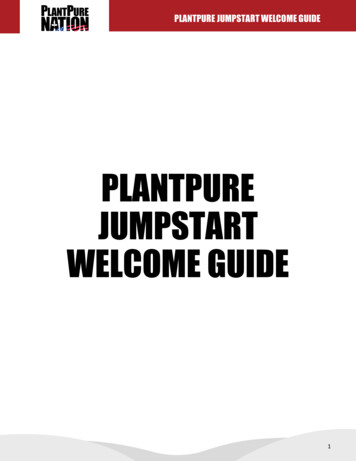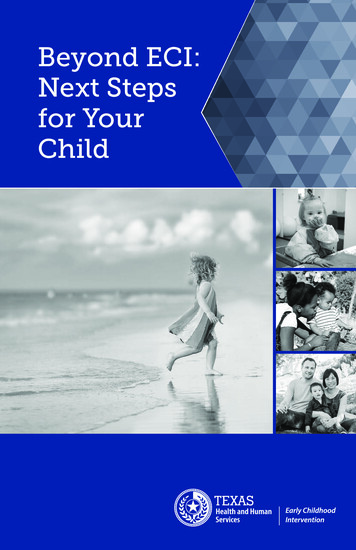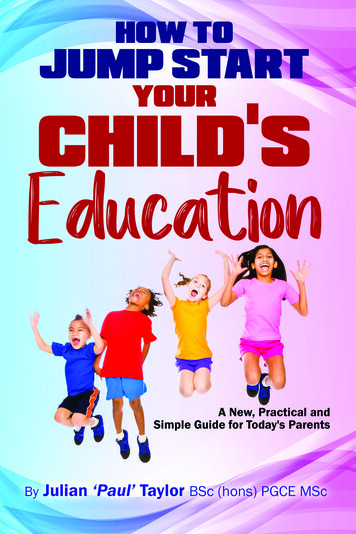
Transcription
How toJumpstart YourChild’s EducationA New, Practical andSimple Guide for Todays ParentsByJulian ‘Paul’ TaylorBSc (hons) PGCE MSc
Julian ‘Paul’ TaylorBorn 13 January 1960 – Died 31st March 2015thMy brother, Julian Taylor, or Paul, as he was known to many, diedsuddenly and unexpectedly of a heart attack in March 2015. Paul hadspent the whole of his life helping people, especially young people, inany way he could.The book you are about to read was written by Paul in the monthsbefore his death. He sent the draft, unedited copy of this book to afriend of his, asking for his edit suggestions. Sadly, Paul passed awaybefore his friend had had a chance to look at the book.It is hard to know what editing ideas Paul would have approved of. So,apart from the odd word change here and there, and without the helpof any editor, these are Pauls words.We all miss him. His family. His friends. And the countless childrenand parents who he has helped over his many years of teaching.
Paul was a gifted school teacher, who was able to connect with childrenand parents alike. This book contains Pauls experience of what canreally make a positive difference to your child’s life. It also containsPauls wisdom, which will help you as a parent make better informeddecisions about your child’s education and your child’s experience oflife.But most of all, this book contains the love that poured out from Paulsheart.Pauls experience, wisdom and love are still alive – still making a positivedifference to everyone who he came into contact with.I hope the ideas and love in this book will help you and your childachieve all you hope for in life.Francis TaylorBrotherSeptember 2017
ContentsPreface ixAbout the Author xiiiIntroduction xvChapter 1: What Do You Expect by Sending Your Childto School? 1The background to my concerns.31. 1. The PISA 2012 Report.62. 2. Depression and Mental Health Issues are aGrowing Concern Amongst the Young.73. 3. Technological Unemployment is Set to Rise Horrifically.7Summary and final thoughts about this chapter.8Chapter 2: Mainstream Schooling: Train or Educate? 10Urgent Secret 1: ‘Mainstream education is not there toeducate your child’. 10The Machine called ‘Society’.10Training versus Education.14Summary and final thoughts of this chapter.16Chapter 3: Do What the Elite and Successful People Do 18Urgent Secret 2: ‘Known methods for achieving success arenot taught in mainstream schools’ 19The 17 Universal Principles of Personal Achievement.19
The findings of an award-winning teacher ‘John Taylor Gatto’.22Urgent Secret 3: ‘Children who attend elite private schoolsare taught things that massively advantage them overchildren educated in mainstream schools’ 22Summary and final thoughts about this chapter.27Chapter 4: Your Child’s Mind and Thoughts Can be Hijacked 29Urgent Secret 4: ‘There are people in the world paid todeliberately manipulate your child’ 32Edward Bernays and Victor Lebow.32Do you realise what this means?.34Here is a personal anecdote.35The Role of ‘Peer Pressure’.37Are there other ways of controlling people?.38Sir Bertrand Russell and Aldous Huxley.38Could there be another explanation?.40Is there another way?.41Summary and final thoughts of this chapter.41Chapter 5: When Did School Ever Teach Your Child Howto Focus Their Mind? 43Urgent Secret 5: School will ask your child to focus, payattention and concentrate, but never teach them how. 45How efficient is your child’s brain and mind?.47Summary and final thoughts on this chapter.49Chapter 6: Simple Exercises to Increase Mental Efficiencyand Brain Power 50Urgent Secret 6: The ‘calmer’ your nervous system is, themore you can pay attention to 51Exercise 1: Relaxing your nervous system using your lungsand mind.52
Exercise Number 2 ‘Directing your attention to just one point’.56Exercise 3 ‘Candle Concentration’.57Exercise 4 ‘Developing your MAM whilst taking control overyour body’.59The Five Senses.62The ability to pay ‘Attention’.62The Ability to Concentrate.62The Ability to Focus.63Sense Based exercises to help develop ‘Attention’,‘Concentration’ and ‘Focus’.63Summary and final thought regarding this chapter.65Chapter 7: Understanding Motivation 67Urgent Secret 7: If the education system was that good, howcome only 2% get to live a life they actually wanted? 68The Basics on how to meet your child’s D needs.70The Story of ‘Mouse’.72‘Peak Experience, Self-Actualisation and Self-Transcendence’.79‘WIFM’.79The Carrot and Stick Method of Motivation.81Summary and final thought from this chapter.82Chapter 8: Help Your Child to Realise That They CanWrite a Script for Their Life 84Urgent Secret 8: School doesn’t teach your child the skill ofwriting a life script 86Goal Setting.893 Key Areas to Focus On.90Monitoring Goals.95Summary and final thought on this chapter.96
Chapter 9: Keep Track of What Your Child Needs to Know 98Recommendations.99List of Examination boards available in the UK.100Examination Boards with web addresses. 101Getting a copy of your child’s exam syllabus/specifications. 101Summary and final thoughts on this chapter.102Chapter 10: Parents: Something Isn’t Adding Up 103Alternative media sites that as parents you might find interesting.104Two Final Skills for Parents.106Final Word. 110Appendix 114References 125
PrefaceIwrote this book for parents so they could help their children andgive them a better chance for both educational and lifetime success.You might think that by sending your child to the local school theywill get everything they need in order to help them be the best studentthey can be, and prepare them for ‘life’. If you do, think again!Let us be honest, not all schools are the same. Some schools have passrates exceeding 90% year on year, and other schools don’t. Some schoolshave very high expectations of their pupils, whereas others don’t. Someschools would actually have achieved much success, if they obtainedpass rates closer to 50%. This thought bothered me.I have 20 or more years of teaching experience, and worked in bothstate schools and fee-paying schools. I have experience of walking theclassrooms of rough schools and the so called ‘elite schools’.I have found that ‘a typical child’ taught in mainstream schools is notbeing taught or given the chances one might expect.How is this possible?They are not being taught or made aware of a few things that woulddramatically improve their academic success, mental ability andimportant life skills.ix
This state of affairs has occurred because the state run schools werenever set up as elite institutions, rather they were set up to educate ‘themasses’. Now this seems pretty obvious, and in some cases, there arechildren who managed to pass through the system and go on to achievegreat success. Those children are to be congratulated.However, having researched what is taught in both mainstream schoolsand so-called elite schools, I am concerned that a typical child is beingshort changed.I understand how this happened, and I understand the motivations ofthose who designed the educational system in the way that it is. Butquite frankly it’s not good enough.Most parents are unaware of the differences that occur between staterun schools and private fee-paying institutions.Since I have taught in both state schools and fee-paying schools, I caninform you, there is a big difference.Recently I returned from India where I had the privilege and pleasure ofteaching in a number of schools. A couple of years ago, I got a chanceto visit a couple of schools in Africa.I was astonished that many youngsters in Indian and African schools,where academically way beyond many children of an equivalent age inthe UK. In fact, the 8-year olds could rattle out answers to questionsthat I would hesitate to ask many teenagers in the UK.I decided this wasn’t good enough and began to find out why. I spent7000 hours researching this topic, and was shocked at what I found.I am grateful to those who have contributed to my knowledge, such asCharlotte Thomson Iserbyt, who wrote ‘The Deliberate Dumbing Downof America’, and to award winning teacher John Taylor Gatto who hastried hard to warn parents of the many shortcomings of mainstreamx
education, and that most parents are unaware of. I am also grateful toFrancis, my brother who has supported me in lots of ways, and not justfor his encouragement to complete this work and make it available toparents.So, it was more than a year ago I kicked off the retirement slippers andbegan to write. Having created a book that addressed many issues, Irealised I had a created an academic Frankenstein of a work, full of factsand as boring as hell. I knew my work was valid, true, but unreadableto most parents.However, rather than whine and moan about how unfair things are, Ithought I would write something to help you, so you can get involvedin your child’s education, and provide your children with some powerfultips and guidelines that will help them for the rest of their lives. This willnot only help them academically, but will help them in their futures.This book is very different than any of the academic books read by mostparents. This book contains thought provoking observations, questions,and solutions not normally offered by those who have been involved inmainstream education. I don’t claim to be an expert. When you readthis book, you will understand why I don’t want to be associated withthe words ‘expert’ and ‘educational system’.No, I acknowledge that my experience in the classroom, and one-timepsychological coach, as well as a lifelong researcher of human nature,gives me a unique perspective that few teachers have.I guarantee that you, as a parent, when you read this book you will learnthings that you never knew before, and if you read and work throughwhat I have written, it will change your views of ‘mainstream education’,and provide simple tips and guidance that will help your child.xi
This book is not the complete story, neither does it have all the answers,but it is a bloody good place to start, and can very quickly become aresource that you can use on a daily basis.This book can be read within a couple of hours, although in places, itis information rich. That said, I have simplified many areas, so that it isnot too academic or a dull read.My belief is that life is a miracle, an opportunity for nature’s intelligenceto demonstrate through the life of the individual, so that they maydiscover who they are, and what they can contribute to the world whilstthey are alive. Education has a key role in this regard, and is not justsimply about getting exam passes and prepared for a job, but is so muchmore.Education is supposed to help children develop intellect, ability toreason, and think for themselves. Has mainstream schooling really donethis? The answer is no. Was this an oversight, or accident? Unfortunately,no. How do I know this? Read this book and find out for yourself.Your children of needs your involvement in their education more thanever before.I am warning you.Your child is on a bus, and it is travelling along a road, and it doesn’tgo where you think it does.If you think I can be of service to you or your family contactme onxii
About the AuthorAs a child I missed out on a great deal of schooling, due to ill health.My education began in earnest around year 8. Through hard workand effort, I managed to get myself to University and study for adegree in biochemistry.I have had a number of careers; research scientist, pharmaceutical salesrepresentative, therapist and motivational coach, university lecturer andthe most important of all, schoolteacher.I have a great interest in helping people to reach their potential,and discover what they are capable of. I have a Master’s degree inxiii
psychology, and this helped me during my time as a therapist, as wellas understanding the teaching principles that were formulated over thelast hundred years.I have been a life-long learner, and studied both eastern and westernphilosophies, spirituality, and sought to understand human nature,including my own.I see life and its many challenges as opportunities for growth, ratherthan as hurdles and an excuse to sit back and do nothing. Towards thisend, I encourage all to grow, develop and find out who they are, andexpress their ‘human creativity’ as best as they can.xiv
IntroductionMost parents willingly hand over their children to completestrangers in the name of education. They entrust them to dowhatever they need to do believing that the ‘education system’will prepare their child for a place in society, and learn the academicskills necessary to have a successful life.No doubt, most parents in their heart of hearts just want their childto be happy and be able to earn a living and pay their way. School issurely the place to go, and learn the rudiments and ways of obtainingsuccess, right?Wrong.I too believed this to be the case, even though in the back of my mindI couldn’t reconcile a nagging doubt. The doubt was that known andproven methods to increase personal achievement and success were notbeing taught within mainstream schools. Despite the chorus of ‘everychild matters’ being sung countrywide.I knew this to be the case, because of the work done by Napoleon Hillalmost 100 years ago. Hill interviewed 500 of the world’s movers andshakers to find out their attitudes and daily habits. His findings aretaught to executives and professionals the world over, because theywork.As I travelled the country, I further noticed too many students seemedincreasingly ‘directionless’ and lacked clarity about their futures.xv
This really bothered me, because by the time a typical child leavesmainstream education, they will have attended some 10,000 hours ofcompulsory education.In my heart, I knew that after 10,000 hours of education, for studentsto still not know what they wanted to do could only mean one thing.The system had failed them.Was this failing an accident, a mishap or was it deliberate? This questionkept me awake at night. I began to research and dig into the rabbit holethat is the education system.What I found was both upsetting, ingenious, and made me sick. Thesystem is very intelligent, but was never set up to fully educate thetypical child.Then during researching this book, the PISA 2012 Report, ‘WhatStudents Know and Can Do’, was published. The report gave the resultsfrom over half a million students from 65 countries, tested in 4 key areas.These were maths, science, reading and ‘engagement’ with learning. Theresults showed that the UK students scored average in all 4 areas; thisis despite billions having been spent on improvements.These results only confirmed my suspicions. That the mainstreameducation system is lacking and failing the children.But in my naivety, I still couldn’t understand why or how. It was only afterreading Charlotte Thomson Iserbyt’s book, ‘The Deliberate Dumbingdown of America’, that I got a foot in the door of understanding. Thus,I spent thousands of hours reading and putting numerous pieces of thejigsaw together.Then I came across the work of award winning teacher John TaylorGatto, who gave me further insight in how to proceed forward andprovide solutions to parents. Thus, in piecing together the story of thexvi
education of your child, I am warning you that most children are neverintended to be fully educated. Further, they are denied key ideas, andmethods that stimulate intellectual growth, development and promotesuccess.This book begins with a summary of my concerns and why I undertookthis work. It then moves on to discuss those who control society andthe dilemmas they face, when ordering and running the machine thatwe could call ‘society’. This book is to educate you, the parents, to thebigger picture that underpins society and those that run it.This will help you understand why your child, yourselves and mostprobably your own parents, were provided with an education that wasnever intended to ‘educate’, but to train you and prepare you for work.Such methods and approaches have worked for years, but your childis living during a time when an estimated 10 million UK jobs are setto disappear due to advances in technology, and in the not too distantfuture.How will your child cope and how are they being prepared?The book then focuses on the work of Napoleon Hill and findings ofJohn Taylor Gatto. It provides clearer details of how children attendingmainstream education are being short changed, and how guaranteedand known methods for achieving success are not taught in mainstreamschools, but are in fact taught in elite fee-paying schools.To educate and help you further, there then follows a chapter thatexplains how people are deliberately paid to manipulate the opinionswithin society, and how indeed ‘the people can be controlled’ throughclever use of psychology and media controlled information. Evidence iscited, and spelt out to provide a powerful back up to my claims.But then the chapter also considers the works of Sir Bertrand Russelland words of Aldous Huxley, two very bright members of the Britishxvii
intelligentsia. More than 60 years ago, they both described howsociety may be or will be controlled using various means, includingthe control of the education system. This chapter will open your eyesto the machinations occurring within society presently, whilst armingyou and informing you what to pay attention to, and how to help yourchildren.The following chapter then discusses the notion of machine ‘efficiency’,and applies this concept to the idea of ‘brain’ and ‘mental’ efficiency.Can you see the irony? Schools the world over will ask their pupils to‘focus’, ‘concentrate’ and ‘pay attention’. But whoever teaches them how?That surely is a blunder?For this reason, the book moves on to give clear instructions on howyou can help your child develop ‘attention’, ‘concentration’ and ‘focus’,using means that will appeal to their senses. These exercises will helpyour child develop their ability to avoid unwanted distractions that takethem away from their learning, and thus improve their mental efficiencyand productivity.The book then covers a working model of human motivation, and usesMaslow’s famous ‘Hierarchy of Needs’, to help motivate your child andsupport them in their endeavours.There is also a discussion of how Maslow believed that only about 2% ofpeople actually get to live the life they wanted to, something he referredto as ‘self-actualisation’. This low figure is clearly startling, and in thefollowing chapter the book addresses how to help your child developthe skills that increase their chances of achieving success and the lifethey want.This chapter is one of the most important within the book, and shouldbe read carefully. Exercises and methods are explained fully and willhelp you help your child.xviii
Award winning teacher, John Taylor Gatto has made observations ofhow elite boarding schools teach many skills that are not taught inmainstream schools. He warns of the importance of ‘being able to writea script for one’s life’, a skill never taught in mainstream schools. Sincethis skill is so very important, an entire chapter is given over to theteaching of your child on how to address this important issue.The book then offers a chapter on how to locate examinationspecifications and these can be used by both parents and your child, tokeep track of what they have learnt, and what to learn and cover next.Web addresses and links are provided to all the examination boardswithin the UK, so you can locate specifications, past papers and markschemes which all children can find useful.The book then finishes with some personal concerns and observationsthat are meant to prompt thinking. Since I have concerns regardingincreasing obesity, diabetes, ADHD, risks from cancer, to name but afew, I show you a simple technique once shown to me by a doctor whohelped save my life. This is a simple skill, that will help you as a parentascertain what foods and drinks are harming your child.Throughout the book, I reveal much knowledge unknown to mostparents, and simplify it in ways that hopefully you can digest. I reveal 8Urgent Secrets which will provoke you, shock you and make you awareas to what needs doing to help your child and their education.xix
Chapter 1What Do You Expect by SendingYour Child to School?What do you secretly hope for your child’s future? You wantthem to be happy, right? You want them to be able to earn aliving, pay their way, meet someone nice and perhaps give youa grandchild or two?These are common thoughts held by most parents, and most parentswill literally spend thousands of hours worrying about their little onesduring the course of their life. This is natural, and no doubt is just apart of the package that is being a parent.Then somewhere around 4-5 years old, you hand your little preciouschild, a source of meaning and treasure to your life over to a bunchof professionals called ‘teachers’. Initially in kindergarten or primaryschool, and later on to secondary school.You willingly allow the nurturing and educational shaping of your childto complete strangers, in whom you place your trust. You believe thosestrangers will do their utmost to do what is best for your child, and toteach them what they need to know.Before we continue, just for a moment ask yourself this simple question.‘What do I expect the local school to do with my child?’ 1
H o w t o J u m p s t a r t Y o u r C h i l d ’s E d u c a t i o nYour answers maybe something like ‘give them an education’, or perhaps‘prepare them for a place in society, so that they learn the skills necessaryto get work or go on to study further’.Ultimately you as a parent may secretly have ambitions for your child,such as becoming a doctor, or lawyer, or some other prestigious post,hopefully that is well paid. But most parents would be content just fortheir child to turn out happy and be able to pay their way through life.Towards this end you send your child to a local school, hoping thatthings will somehow work out. You will hand over full control to aneducational system, trusting that your precious child will be looked afterand taught what they need to know.As a school teacher for more than 20 years I can reassure you that mostteachers will do their best to look after your child, but I am going todraw your attention to areas that you parents need to be aware of.These areas may frustrate you, anger you and probably piss you off. Theydid me, and that was one reason why I retired early.But there is no point moaning or burying your head in the sand. Thisneeds to be addressed, needs addressing right now, and that is why Ihave written this book.I don’t want to burden you, but I am sorry I have to. You see, commonsense and integrity means I have to make you aware of ‘shortcomings’inherent within the educational system itself. I don’t wish to have a goat anyone in particular. Although I could.My message to you is, ‘Things are not what they seem’.2
J u l i a n ‘ Pa u l’ T a y l o rThe background to my concerns.At one time, through ill health, I became too ill to continue teaching,and retrained as a hypnotherapist, psychotherapist and neurolinguisticprogrammer (NLP). To be honest, I was really good at it, and reallyenjoyed helping others. I ended up with a Master’s degree in psychologicalstudies, which gave me a broad perspective on psychology and allowedme to learn about lots of things.During my time as a therapist, I came across the works of one NapoleonHill, who almost 100 years ago carried out research into how 500 ofthe world’s movers and shakers were so successful. He found out theirdaily habits and attitudes and produced a piece of work entitled, ‘The17 Key Principles of Success’. At the time, I was amazed how simple theprinciples were, and wondered why they were not taught to children asa matter of course.I then discovered the work of Tony Robbins, author of ‘Awaken TheGiant Within’ and ‘Personal Power’. Again I wondered why suchtechniques were not taught to children.One day I decided to return to the classroom and help where I could.I loved teaching, interacting with the children, and increasing theirknowledge of science as well as their confidence wherever I could.During the summer of 2004, I self-funded and attended a ‘Discoverysummer camp’ run by the Tony Robbins Foundation. The summercamp was run to help teenagers acquire more personal power anddevelop those skills normally taught to executives and the like. It wasamazing; albeit hard work, but brilliant.Teachers attending the summer camp had the privilege of meeting atrue teacher of teachers, a genius; Dr Lawrence Martell of Intellilearn.org. Larry was a great person and true inspiration; he promoted theneed to involve the heart during learning because of significant neural3
H o w t o J u m p s t a r t Y o u r C h i l d ’s E d u c a t i o nconnections that ran from the heart to the brain. When Larry passed,the profession lost a true great.Dr Lawrence Martell, author of ‘The Seven Secrets of Learning’ revealed,what your teachers never taught you, because your teachers never knew’(1), and the Julian Taylor, 2004.After I got back to the UK, I started to pay attention to the variousteenagers I knew and came into contact with. I noticed something thatbothered me, which was initially difficult for me to put my finger on.At first, I didn’t want to see it, and I went into temporary denial.The children’s ability to pay attention and concentrate in the classroomseemed different. There were more students diagnosed with ADHD,Asperger’s and even depression. My scientifically trained mind, askedthe question, ‘Why’? ‘What is causing these problems?, but I soon learntthat teachers are there to teach, and not ask such questions.The curriculum had changed and not only changed once, but severaltimes, but still met the criteria of the National Curriculum introduced4
J u l i a n ‘ Pa u l’ T a y l o rin 1992. I was a big advocate of the NC back in 1992. In recent timesthe national curriculum has been updated and is available online (2).Methods and approaches to ‘teaching’ had changed, and indeed hadbecome more prescriptive. Policies such as ‘Every Child Matters’, and‘No Child Left Behind’, became familiar to all teachers, and influencedtheir teaching.But as I stood back, I noticed that the responsibility for the education ofchildren had shifted to make the teachers res
Charlotte Thomson Iserbyt, who wrote ‘The Deliberate Dumbing Down of America’, and to award winning teacher John Taylor Gatto who has tried ha


